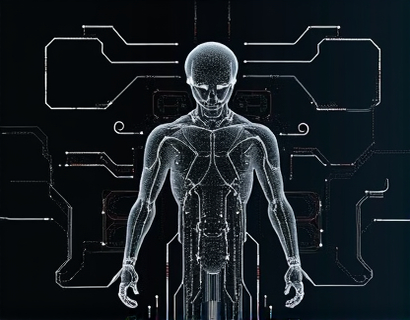AI Certification Evolution: Specialized Digital Accreditation for Skill Validation and Career Advancement
The digital age has ushered in a transformative era for professional development, particularly in the realm of artificial intelligence (AI). As AI technologies continue to advance and permeate various industries, the demand for specialized skills and certifications has surged. This evolution in AI certification is not just about acquiring a piece of paper; it's about validating expertise through comprehensive tasks and educational milestones. This article delves into the significance of this specialized digital accreditation, its impact on career advancement, and how it maximizes both individual and organizational potential in the tech industry.
The Rise of Specialized AI Certifications
Traditional certification methods often fall short in capturing the nuanced skills required in AI. The complexity and rapid evolution of AI technologies necessitate a more dynamic and task-based approach to validation. Specialized AI certifications have emerged to address this gap by offering credentials that are directly tied to specific skills and competencies. These certifications are designed to assess a candidate's ability to perform real-world tasks, thereby providing a more accurate measure of their capabilities.
The shift towards task-based certifications is driven by the need for employers to ensure that their workforce possesses not just theoretical knowledge but practical skills. This approach aligns with the learning-by-doing philosophy, where candidates demonstrate their proficiency through completed tasks and educational achievements. Such a method ensures that the certified individual has a deep understanding of the subject matter and can apply it effectively in various scenarios.
Enhancing Professional Credibility
In the competitive landscape of the tech industry, professional credibility is paramount. Specialized AI certifications serve as a tangible proof of an individual's expertise, enhancing their credibility in the eyes of potential employers and clients. These certifications are recognized across the industry, providing a standardized way to validate skills. When a professional holds a reputable certification, it signals to employers that they have undergone rigorous evaluation and have met specific industry standards.
Moreover, these certifications help in differentiating candidates in a crowded job market. In a field where AI roles are increasingly common, having a specialized certification can set an individual apart from others with similar qualifications. It demonstrates a commitment to continuous learning and a dedication to staying current with the latest advancements in AI technologies.
Career Advancement Through AI Certifications
The impact of AI certifications on career advancement is significant. Professionals who invest in these certifications often experience a notable boost in their career trajectories. Employers are more likely to consider candidates with specialized certifications for advanced roles or leadership positions, as these credentials indicate a higher level of expertise and reliability.
For those looking to transition into AI-related fields, these certifications can be a gateway. They provide a structured path to acquire the necessary skills and validate them through recognized assessments. This structured approach not only accelerates the learning process but also ensures that the skills gained are relevant and in demand.
Additionally, AI certifications can lead to higher earning potential. Studies have shown that professionals with relevant certifications tend to command higher salaries compared to those without. This financial incentive further underscores the value of investing in specialized AI training and certification programs.
Maximizing Educational Potential
Beyond career benefits, specialized AI certifications also maximize educational potential. These programs are designed to be comprehensive, covering a wide range of topics from foundational concepts to advanced applications. By completing these certifications, individuals not only gain practical skills but also a deep theoretical understanding of AI technologies.
The educational milestones within these certifications ensure a gradual and structured learning experience. Each milestone builds upon the previous one, creating a robust foundation of knowledge. This approach helps learners to grasp complex concepts more effectively and retain information better. The hands-on tasks and projects included in the certifications provide practical experience, which is invaluable in a field where theory alone is insufficient.
Furthermore, many AI certification programs offer continuous learning opportunities. As AI technologies evolve, these programs are updated to include the latest trends and tools. This ensures that certified professionals remain at the forefront of the field, continuously enhancing their skills and knowledge.
The Role of AI Accreditation Platforms
AI accreditation platforms play a crucial role in this evolution by providing a structured and recognized framework for skill validation. These platforms offer a variety of certifications tailored to different levels of expertise and specific areas within AI. By leveraging these platforms, individuals can access high-quality educational resources and assessments that are aligned with industry standards.
One of the key advantages of these platforms is their ability to provide immediate and verifiable credentials. Upon completing the required tasks and passing the assessments, candidates receive a digital certificate that can be easily shared and verified. This seamless process enhances the credibility and utility of the certification in both personal and professional contexts.
These platforms also foster a community of learners and professionals, facilitating networking and collaboration. This community aspect is invaluable for those seeking to stay updated on industry developments and best practices. Engaging with peers and industry experts through these platforms can lead to new opportunities and insights that further enhance one's career and educational journey.
Conclusion
The evolution of AI certifications represents a significant step forward in professional development and skill validation. By offering specialized credentials that are tied to real-world tasks and educational milestones, these certifications provide a robust framework for career advancement and educational growth. In an era where AI is increasingly integral to various industries, possessing these certifications is not just beneficial but essential for staying competitive and relevant.
As the tech landscape continues to evolve, the demand for specialized AI skills will only grow. Embracing these certifications is a strategic move for individuals and organizations aiming to thrive in the digital age. By investing in these recognized accreditations, professionals can enhance their credibility, open doors to new opportunities, and maximize their potential in the ever-expanding world of AI.










































